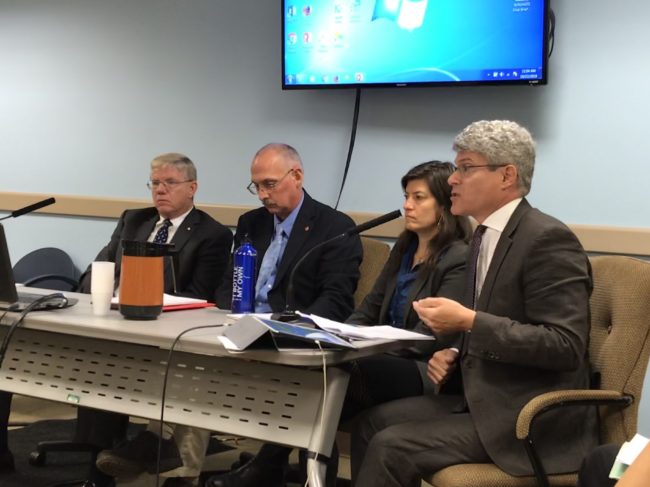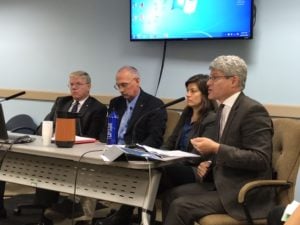Riverkeeper testifies at NYC Council hearing on storm barrier study

View more images on our Flickr site
Army Corps commits to more time, more money in review of coastal protections
Riverkeeper gave testimony today as New York City Council members considered a resolution calling on the Army Corps of Engineers to consider sea level rise – not just storms – in its flood protection plans.
Click here to watch the recorded video. Testimony by the Army Corps and Riverkeeper begins at 54:00.
Council Member Costa Constantinides, Chair of the Committee on Environmental Protection, is urging the Corps to take a broader approach as it undertakes what he termed “the study of our lifetime.”
Bewilderingly, the Corps was tasked only with addressing coastal zone flooding and storm surge – not sea level rise – in its New York – New Jersey Harbor and Tributaries (NYNJHAT) Coastal Storm Risk Management Feasibility Study. Among the six options under review are giant, costly storm surge barriers, which would have catastrophic consequences for the Hudson River and do nothing to protect against flooding from sea level rise – only storms.
 Jessica Roff, Director of Advocacy and Engagement, and Paul Gallay, President and Hudson Riverkeeper, delivered Riverkeeper’s testimony:
Jessica Roff, Director of Advocacy and Engagement, and Paul Gallay, President and Hudson Riverkeeper, delivered Riverkeeper’s testimony:
“If the Army Corps, New York, and New Jersey are going to spend billions of dollars – the latest figures are in the $140 billion range – on coastal storm protection, they need to be asking the right questions; doing the proper and comprehensive studies; proposing and implementing solutions that protect people, ecosystems, and our waterways, including the Hudson River; while being transparent and engaging communities throughout the affected geographical region.
“We strongly believe in a process that builds community-driven, resilient, and protective shorelines that also defend against smaller scale, more regularly occurring flooding events, and does not sacrifice the Hudson River, New York Harbor, the smaller waterways, and marine life at risk in most of the Corps’ potential plans.”
Click here to read a copy of our written remarks.
Earlier this month, the Corps agreed to allow more time before advancing any of the six options under review.
Today there was more positive news: The Corps said it expects to be granted a waiver from a federal policy that limits the time and money allowed for the study; three years and $3 million. The so called “3x3x3” waiver is expected by the end of November. A Corps official termed the study the largest ever in its history. It could cost at least $19 million.
[UPDATE, November 19: U.S. Army Corps approves waiver for New York & New Jersey HAT Study]
Eighteen communities along the Hudson River have called for more time, information and public meetings on the barrier study.
Speaking at the New York City hearing, Paul Gallay stressed the need for a community-based approach, with equity, creativity, courage, “and a little luck.”
Riverkeeper called for more steps by the Corps to meaningfully involve the public in its study:
• They must share which studies they are planning to evaluate and which they will undertake and when;
they need to have, and communicate with, a comprehensive mailing list of everyone who has attended a meeting, commented, or communicated with the Corps in the area of potential impact;
• They need to be publicizing their meetings, deadlines, updates, and information in places other than their website.
• The Corps must undertake outreach to community groups, local elected officials, and environmental groups; they especially need to do authentic outreach and engagement with environmental justice communities and groups – who as the most impacted by storm surge and sea-level rise often have many solutions, but may not have the resources to implement them. The Corps and New York state must also consult with Federal and State recognized tribes who will be affected by this study – to date there has been no mention of tribal nations. These must be real conversations with intentional information exchange.
Learn more at Riverkeeper.org/barriers.
Visit this page to send your message to the Army Corps by November 5.
